A nursing mother's diet should be varied, healthy and balanced, so don't be afraid to include new foods in the menu. Among them, vegetables are a valuable source of vitamins and minerals. Let's consider in this article whether eggplants can be consumed while breastfeeding.
What are the benefits of eggplants?
Eggplant is a herbaceous plant of the nightshade family with edible dark blue fruits. For their beneficial properties, in the East they are called vegetables of youth and longevity. Women who are breastfeeding are advised to include eggplants in their diet, as they are a real storehouse of vitamins and minerals:
- B vitamins that normalize metabolic processes and the functioning of the central nervous system;
- ascorbic acid, which helps increase immunity and protect the body from colds;
- tocopherol (vitamin E), which prevents skin aging and the development of malignant tumors;
- retinol, which has a beneficial effect on the organs of vision, quickly restores damaged tissue, strengthens bones;
- beta-carotene, which strengthens the immune system and increases stress resistance;
- calcium, which stabilizes blood clotting, strengthens bone tissue and tooth enamel;
- potassium, which normalizes water balance, strengthens the muscles of the heart, and supplies brain cells with oxygen;
- magnesium, which supports the functioning of the nervous system and removes toxic substances from the body;
- sodium, which normalizes the acid-base balance and dilates blood vessels.
The content of microelements such as iron, manganese, copper, zinc, phosphorus, fluorine, etc. contributes to:
- improving the functioning of the gastrointestinal tract, preventing constipation;
- prevents the development of diabetes, gout, anemia;
- strengthening the immune and cardiovascular systems;
- activation of the liver and kidneys;
- increasing the body's resistance to viruses and infections;
- reducing the level of “bad” cholesterol.
Regular consumption of eggplants promotes rapid recovery of the female body after childbirth. The beneficial substances contained in blue vegetables ensure the full development and growth of the baby, since they enter the bloodstream along with mother's milk.
Is it possible to eat eggplant while breastfeeding?
Roommates and caring relatives have probably already told you that it is better not to eat colored vegetables. Eggplants come in different colors depending on the variety. The most common is dark purple. It is supposed to be on the list of prohibited products. But the abundance of vitamins and minerals that mother and baby lose by refusing it does not allow us to clearly determine the answer to the question of whether eggplants are ok for breastfeeding.
The benefits of eggplant for a nursing mother
This vegetable contains a lot of fiber. It will improve digestion for mother and child and cleanse the body of toxins. The low amount of calories is another plus. 24 kilocalories will not add extra centimeters, even if there are ten trips to the refrigerator per day. But the main source of benefit is the abundance of vitamins and microelements. We will talk about them in more detail.

Vitamins and nutrients of eggplants
Eggplants have a complex effect on the body during breastfeeding. To improve your appearance, mood and well-being, you need to add them to your diet. Such a comprehensive effect is provided by the beneficial substances in the composition.
- Vitamins B6, B9, E fight aging;
- Calcium, fluorine, phosphorus, zinc, vitamins B2 and A strengthen bones and tooth enamel, improve hair and nails;
- Fluorine, molybdenum, manganese, zinc and vitamin E prevent osteoporosis, caries, diabetes, gout, epilepsy, rheumatism and arthritis, and reduce the likelihood of developing cancer;
- Beta-carotene, copper, niacin, vitamins B6 and C relieve nervous tension and stress;
- Phosphorus, vitamins B1 and B5 develop memory and improve brain function;
- Vitamin C, beta-carotene and fluoride strengthen the immune system;
- Calcium, iron, niacin, vitamins B5, B9 and E improve blood clotting, promote the functioning of the heart, kidneys and develop reproductive functions.
Read also: Tylosin analogues for animals
The nutritional benefits of this vegetable are beyond doubt, but there are cases when it is better to refrain from including it in the diet.

When is the best time to avoid eggplants?
Gastritis, ulcers, diarrhea, colitis or pancreatitis - with these diseases, the answer to the question whether eggplants can be eaten during breastfeeding will be negative. Fiber and coarse fibers will be difficult for the body to digest.
This vegetable contains many oxalates, so it should not be consumed if you have kidney disease. Because of this, chronic diseases may worsen.
You cannot prepare dishes from overripe fruits. They form the alkaloid solanine, which will lead to poisoning.

Can a nursing mother eat eggplants - Komarovsky’s opinion
Nutrition while breastfeeding raises a lot of questions. Pediatricians or nutritionists can give a competent answer.
For example, E.O. When it comes to feeding a nursing mother, Komarovsky has a negative attitude only towards strong allergens: strawberries, chocolate, citrus fruits. The rest of the products can be eaten. But the mother must monitor the baby’s reaction to new food. This also applies to eggplants.

When should you say no?
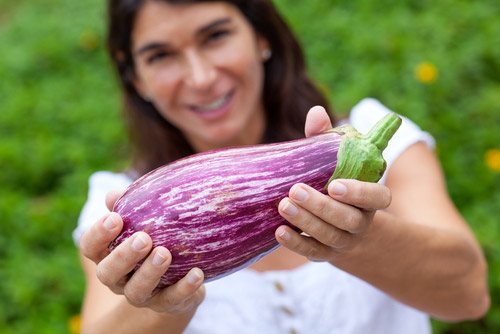
The body of a newborn is very susceptible to any innovations. Mom needs to be very careful when eating eggplant for the first time during lactation: monitor the baby’s reaction. In case of skin rashes, stool upset, or bloating, you should say no to the blue vegetable. These symptoms will disappear 2-3 days after eliminating them from the diet.
You can repeat the experiment after 3-4 weeks: eat a small piece of boiled or steamed vegetable. Practice shows that 90% of babies do not experience any reaction when eggplant is reintroduced. Then a nursing woman can eat vegetables in moderation.
Rules for eating eggplant for a nursing mother
During breastfeeding, eggplants perfectly diversify the diet. You need to follow the rules of consumption and the young mother’s menu will be nutritious and healthy thanks to this vegetable.
- For the first time, eat a small piece and watch the child’s reaction. If it is absent, you can gradually increase the portion;
- If your baby has allergies or digestive problems, you will have to say goodbye to the vegetable for a while. You can try it again after 3 weeks;
- Mom should know when to stop: you can eat no more than 100 grams per day, and 300 per week;
- Buy only carefully selected vegetables: young, without spots or spots. They should not be lethargic;
- It is necessary to wash the vegetables well and it is advisable to soak them before cooking, so they will absorb less oil and will not be greasy;
- Use olive or sunflower oil with them, and season with sour cream or natural yogurt.

When can it be introduced into the diet?
You can eat these vegetables when your child is 3-4 months old. At this age, his body is already ready to try a new product. Possible earlier introduction. If a woman ate these vegetables during pregnancy, she can try them 2 months after giving birth.
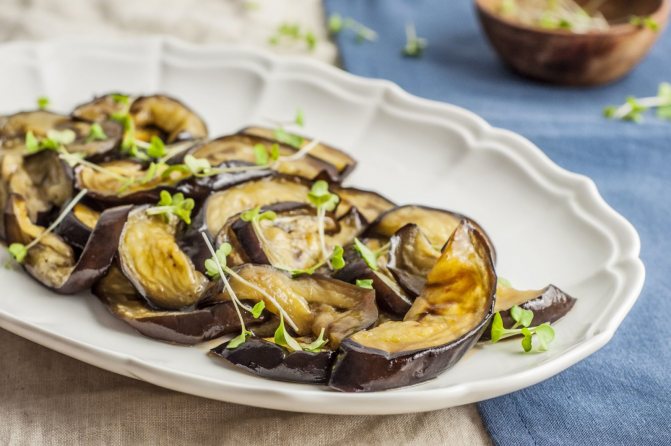
How to choose eggplants?
To make a tasty and healthy dish from this vegetable, you need to choose them correctly. The vegetable must be young, then the food will not taste bitter. The stalk is brown, and the fruit itself is spotted and limp, which means it was picked a long time ago. Size is also important. Better - average. It will have less solanine.
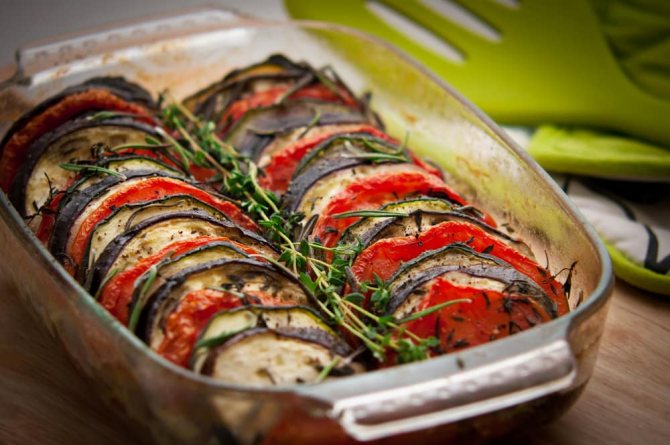
In what form can a young mother eat eggplant?
The menu should be useful. This is an important nutritional requirement for mothers during lactation. To do this, the products must be properly prepared. Eggplants can be stewed, baked or boiled. This way they will retain all their benefits. But frying them during this period is not recommended.

Rules for introducing into the diet
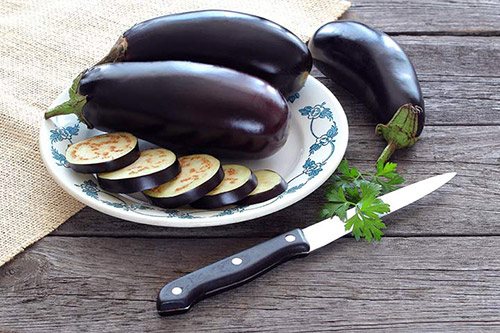
The main rule when including eggplant in a nursing mother’s menu is moderation and gradualness. Despite the fact that blue vegetables are allowed for consumption during breastfeeding, this cannot be done immediately after the birth of the child, that is, the vegetable must be abandoned in the first month.
It is better to wait until 3 months, when the child’s body adapts to the environment, mother’s milk and other external conditions.
When deciding to include eggplant in the menu, follow these rules:
- Bake, stew or boil the vegetable without adding spices or salt. It is advisable to do this during the vegetable ripening season - summer and autumn. During this period, vegetables are the healthiest. Preference should be given to a product grown in natural (not greenhouse) conditions.
- Try a small portion. The permissible amount at one time is no more than 100 g. Observe the baby’s condition: whether allergies have manifested themselves, whether the tummy hurts.
- Cook eggplants no more than 2-3 times a week, gradually increasing the serving size to 150 g.
- If, while pregnant, you regularly consumed eggplants, you are allowed to introduce them a little earlier, for example, 1.5 months after the birth of the child.
Stewed eggplants: cooking for a nursing mother
Preparing stewed eggplants should not be difficult, the main thing is that the vegetables you choose are not overripe, and do not have stains or damage.
Understanding that you first need to find out whether you can eat this vegetable and whether it is suitable for your baby, we offer a very simple recipe for making stewed eggplant, containing a minimum of ingredients.
To prepare this dish we will need:
- Eggplants (medium) - 3 pcs.;
- Wheat flour - 1 tbsp. l.;
- Sour cream - ½ tbsp;
- Vegetable oil - 2 tbsp. l.;
- Salt and chopped dill and parsley - to taste.
How to prepare an eggplant dish that is healthy for nursing
Before you start cooking, wash the eggplants, peel them, cut them into slices and fill them with cold salted water for about a quarter of an hour. Such “baths” will help rid vegetables of bitterness and saturate the porous structure of the pulp with water, which will prevent the absorption of excess oil during frying.
- Dry the prepared eggplant slices with a paper towel.
- Roll them in flour, add salt and fry them in hot vegetable oil,
- Add sour cream, close the lid and simmer the eggplants for about half an hour.
- Transfer the finished dish to a salad bowl and sprinkle with herbs.
You can cook stewed eggplants while breastfeeding in a regular frying pan with a lid, or you can use this recipe for cooking in a slow cooker using the “fry” and “stew” modes.
Constant hunger is a problem familiar to women who are breastfeeding. This feeling reminds itself with enviable regularity: every 1.5-2 hours. Sometimes mommy makes 6-7 trips to the refrigerator a day, but satiation never comes. Everything is complicated by the lack of mysterious knowledge of the “society of new mothers” about what can and cannot be eaten. To get this information, you need to go through a rite of passage with baby colic and allergies. The well-known rule in these circles “food should be varied and nutritious” further complicates life, creating new questions. One of these is: can a nursing mother eat eggplant?
No time to read? Download a free list of allowed and prohibited foods during lactation
How to choose?
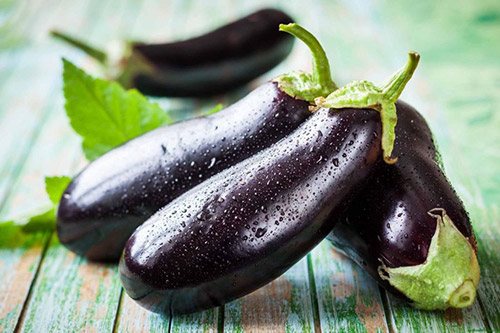
During lactation, only young eggplants without visible damage (spots/black spots) can be consumed. Overripe and rotten brownish fruits accumulate a lot of solanine, a poisonous alkaloid that is destroyed when frying and soaking in salted water. It is not advisable to eat fried/salted fruits while breastfeeding.
Breastfeeding experts recommend that mothers peel blue vegetables, as toxic substances also accumulate there.
Preference should be given to eggplants grown in the home garden without fertilizers and chemicals or purchased at the market from familiar private traders during their ripening period. You can freeze the product for future use and use it all year round. Breastfeeding women should choose small white/light purple fruits.
Blue vegetables should not be eaten raw/undercooked or fried. When frying, a large amount of fat accumulates in them, which is harmful to mother and baby. Grilled/oven-baked or steamed vegetables are preferred. Prepared in this way, they retain their beneficial properties as much as possible. Freshly prepared eggplant caviar is allowed. But it’s better to say no to canned (pickled) fruits, since the vinegar contained there can upset digestion.
It is not recommended to eat pickled eggplants: they contain vinegar, which negatively affects the digestive system of the expectant mother.
Combination with other products

Nutritionists advise nursing mothers to eat eggplants together with other foods that are no less beneficial during lactation. In their opinion, the following food categories go well with them:
- rice, buckwheat, lentil, pearl barley;
- whole grain or rye bread;
- chicken (or turkey);
- veal/lean beef;
- green vegetables;
- yellow/green sweet pepper;
- green apples;
- chicken/vegetable broth.
It is not advisable to combine eggplants with red/orange vegetables and spices when breastfeeding.
Diet recipes
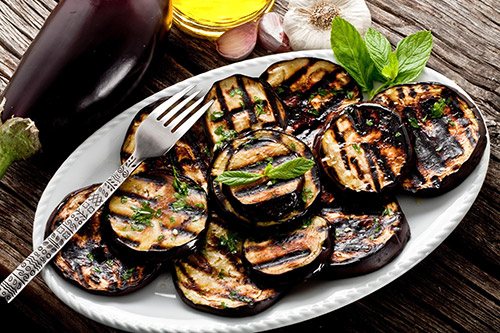
Eggplants can be used to prepare many healthy and tasty dishes that are approved for consumption by women who are breastfeeding. Let us give examples of simple dietary recipes that do not contain allergenic products prohibited during lactation.
Boiled eggplants with cauliflower
- Prepare the vegetables - 2-3 small eggplants and half a medium head of cauliflower: wash thoroughly, dry, peel the blue vegetables (you don’t need to peel them).
- Then boil them in salted water - each for 7 minutes, cool and cut.
- Finely chop the greens: celery leaf, parsley and dill.
- Mix all ingredients, add a little salt.
- Season with sunflower/olive oil.
- Add a little apple cider vinegar if desired.
Eggplant salad with apple and green peas
- Peel 2 medium blue vegetables, cut into small slices, simmer for a few minutes in a slow cooker with a little olive oil.
- Then add a small finely chopped onion, stir, turn off.
- Cool the vegetables, add to them one finely chopped apple, 1 boiled egg, and, if desired, 100 g of green peas (not canned, but fresh).
- Prepare the sauce: mix half a glass of low-fat sour cream/natural yogurt, 1 tsp. mustard and lemon juice.
- Season the vegetables with sauce.
Eggplant pate
- Bake thoroughly washed vegetables (2 pieces) in the oven for 15 minutes.
- Let them cool and then scoop out the pulp with a spoon.
- Sauté 1 onion in a small amount of vegetable oil.
- Place 3 boiled eggs, eggplant pulp, and onion in a bowl and blend with a blender until creamy.
- Lightly salt and season with sunflower oil. The pate is ready. A tasty and healthy delicacy can be spread on crispbread/rye bread.
Eggplant caviar
- Wash and dry 3 medium-sized eggplants, 2 tomatoes, 1 carrot, 1 onion, 1 pc. bell pepper (green/yellow).
- Cut the vegetables into 4 parts, bake in the oven for half an hour, add a little water if necessary. Please note that vegetables should be baked in foil for the first 15 minutes.
- Cut the cooled food into cubes, put it in a saucepan, add a little water and tomato paste (to taste), simmer for about 20 minutes.
- Then lightly salt, season with apple cider vinegar, cool and, if necessary, blend with a blender.
Eggplant baked in yogurt
- Peel 2-3 blue vegetables and 1 small zucchini, cut into cubes.
- Lightly adding salt, place in layers in clay pots, add yogurt (so that it is half full).
- Bake in the oven at 180 degrees for 35-40 minutes.
- Sprinkle with grated cheese before serving.
Vegetable stew
You will need the following products:
- bulb,
- carrot,
- bell pepper,
- cabbage,
- eggplants.
Decide on the quantity yourself, based on the volume you need.
Cut the onions and carrots into cubes and sauté with a little olive oil until soft, then add shredded cabbage and peppers and simmer in a small amount of water for about half an hour.
While the vegetables are cooking, peel the eggplants, cut into cubes and add to the pan. At the end of cooking, add a little salt. Monitor the volume of liquid, add water as it boils, making sure that the stew is not too liquid.
Greek casserole - moussaka
A very healthy and tasty dish, but a little fatty, so a nursing mother should include it in her diet after reaching 4-6 months after giving birth.
Required ingredients:
- 2 eggplants,
- 300 g lean minced meat (beef/chicken),
- 1 onion,
- 3 potatoes,
- 2 eggs (chicken/quail),
- 1 glass of milk,
- greenery,
- vegetable oil.
First, fry the minced meat with a small amount of onion, add the rest of the vegetables (cut first), simmer for about 10 minutes. Beat the eggs with milk, herbs and a little salt, pour them over the vegetables and minced meat. Transfer the mixture into a mold and bake in the oven for 15 minutes. 5 minutes before cooking, you can sprinkle cheese on top. Cheese/feta cheese is preferable.
When changing their diet, nursing women should remember that moderation and gradualism must be observed in everything. Then there will be no problems with the health of mother and baby.
What to cook
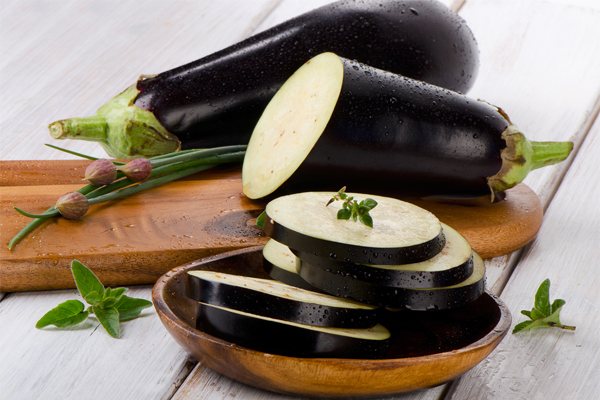
Can a nursing mother eat eggplant not only boiled, but also in the form of stew, caviar, puree or delicious rolls? We remember that it is worth excluding pickled foods; otherwise, mom is allowed to show her culinary imagination.
Eggplant caviar
You will need one medium-sized onion, two carrots, two or three eggplants, dill or parsley, salt and vegetable oil.
The recipe is quite simple. Lightly fry the finely chopped onion, then add the diced carrots and eggplants, salt and herbs. Simmer for only 20-30 minutes. Rich and tasty caviar is ready!
Vegetable stew
In addition to healthy blueberries, this dish includes zucchini, potatoes and carrots, which also have a positive effect on the body of mother and child.
Wash and peel the vegetables. Cut into small cubes and simmer in olive oil. Season with salt and pepper. If desired, add a little garlic, but only if the baby reaches 5-7 months of age. Don't simmer for too long. Cooking time 20-30 minutes, check the softness of the potatoes. This method of preparing the stew will retain the maximum benefit from the vegetables.
To summarize, we note that eggplant is an excellent addition to a balanced diet during lactation. The benefits are obvious both for the restoration of the mother’s body and for the baby, who with milk will receive the vitamins and microelements so necessary for growth and development. Follow all the rules for introducing and preparing this product, then you will get maximum benefits for your health.

- Related Posts
- Is it possible to drink mineral water while breastfeeding?
- Can a nursing mother eat vinaigrette: which ingredients are dangerous?
- Cinnamon during breastfeeding
« Previous entry











